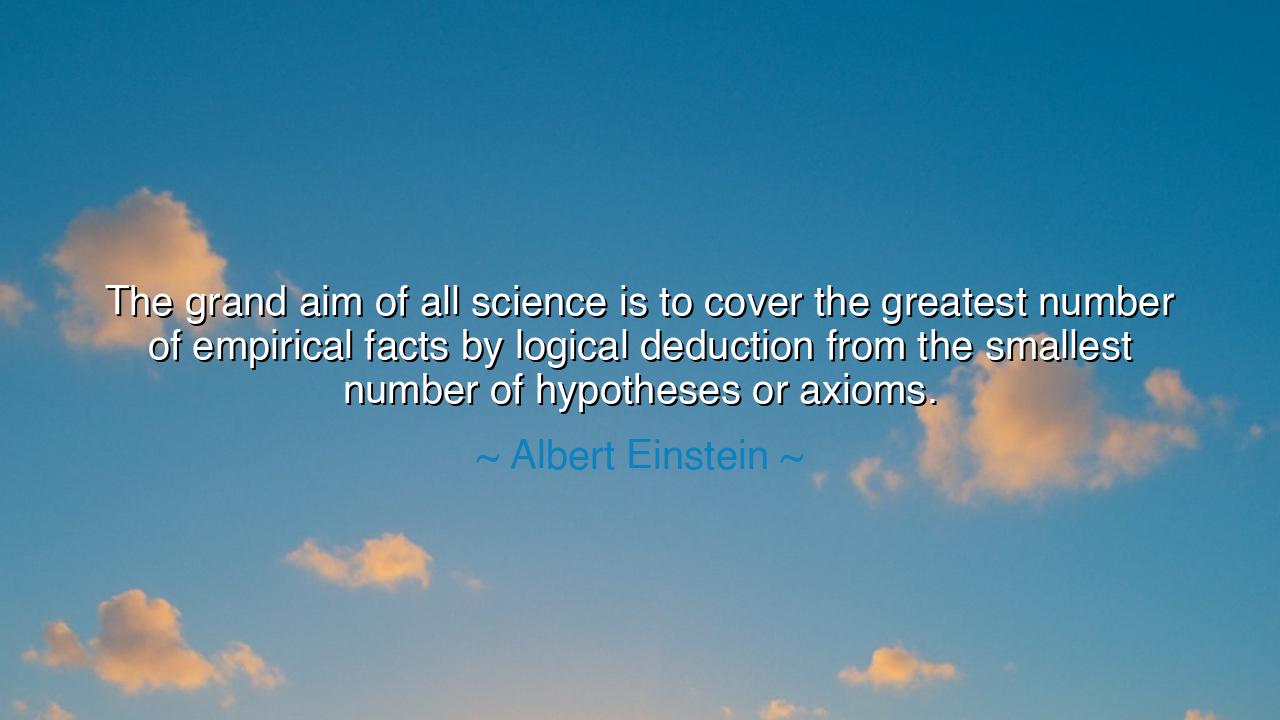
The grand aim of all science is to cover the greatest number of
The grand aim of all science is to cover the greatest number of empirical facts by logical deduction from the smallest number of hypotheses or axioms.






**Hear now, O seekers of knowledge, for there are words of great wisdom spoken by one of the greatest minds in human history—Albert Einstein, whose quest for truth led him to unravel the very fabric of the universe. He said: “The grand aim of all science is to cover the greatest number of empirical facts by logical deduction from the smallest number of hypotheses or axioms.” These words, though simple, carry a profound understanding of the very nature of science—its purpose, its methods, and its ultimate pursuit of simplicity and unity.
What, then, is the meaning of these words, O children of wisdom? Einstein is reminding us that science does not seek complexity for the sake of complexity, nor does it aim to overwhelm us with countless details. Instead, its true aim is to find the underlying simplicity that binds the vast array of phenomena we observe. Just as the artist seeks to capture the essence of life in a few bold strokes, science seeks to explain the most facts with the fewest principles. The greatest beauty of science lies in its ability to simplify the world, to reduce the infinite variety of experiences and observations into a set of universal truths.
Consider the story of Newton’s laws of motion, which revolutionized the way we understood the universe. Before Newton, the movements of the planets, the forces of nature, and the mechanics of motion were perceived as separate and distinct. But through logical deduction, Newton distilled the universe into three simple laws, each encompassing a vast array of phenomena. These laws, simple in their expression, apply to everything from the fall of an apple to the motion of the stars. Newton’s genius lay in his ability to explain a multitude of complex observations with a few clear principles. In this, he demonstrated the very spirit of Einstein’s vision—to reduce the overwhelming complexity of the world into a set of elegant truths that could explain it all.
This pursuit of simplicity is not limited to physics alone, but extends to all fields of science. Take, for example, the theory of evolution, first proposed by Charles Darwin. Darwin’s hypothesis about natural selection—the idea that species evolve over time through the process of adaptation to their environment—offers a simple yet profound explanation for the diversity of life on Earth. In a single idea, Darwin encapsulated the reason for the changes observed in nature, from the smallest organisms to the largest creatures. Through his theory, Darwin unified a multitude of disparate observations into a coherent, logical explanation, demonstrating how science can provide clarity and understanding through a few guiding principles.
But even the most profound scientific ideas, such as Einstein’s own theory of relativity, are born from the same drive for simplicity and unity. Relativity reduced the complex observations of space and time to a unified framework that explained the behavior of objects at high speeds and the nature of gravity. Through logical deduction from a few fundamental principles—such as the constancy of the speed of light and the nature of spacetime—Einstein was able to explain a vast range of phenomena, from the bending of light around stars to the behavior of time itself. Einstein’s genius lay in his ability to take the complex and make it simple, to distill the world’s mysteries into a few elegant equations that could explain the vast and incomprehensible.
The lesson here, O children, is this: Science is not simply a pursuit of knowledge for its own sake, but a quest to uncover the simplicity that underlies the vast complexity of the world. The true power of science lies in its ability to uncover unifying principles, to reduce the overwhelming multiplicity of facts to a few fundamental truths that explain it all. In the pursuit of knowledge, we must not be content with the superficial or the complicated, but strive to understand the underlying simplicity that governs all things. Just as the greatest artists capture the essence of life in a few strokes, so too must the scientist seek to capture the essence of the universe with a few well-chosen ideas.
So, O children of the future, let this wisdom guide your journey: Seek simplicity in all things. When faced with a challenge, whether in science, art, or life, remember that the most profound answers are often the simplest ones. Do not be swayed by complexity for its own sake, but seek to understand the world in its purest, most elegant form. In this pursuit, you will uncover not only the truths of the universe, but also the profound beauty that lies within it.
Embrace the simplicity of science, and let it be the guiding light on your path to understanding the world and your place within it. Let logical deduction lead you, as it has led those who have come before you, to the heart of the mysteries that surround us. In this simplicity, you will find the key to unlocking the greatest secrets of all—the profound unity of the universe itself.






AAdministratorAdministrator
Welcome, honored guests. Please leave a comment, we will respond soon